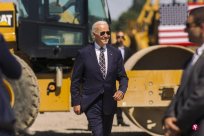(Washington News) Economists and trading experts believe that the end of the first round of negotiations in the Indo -Pacific Economic Framework (IPEF) highlights that Asian countries must establish contact with the United States in trade, while cooperating to increase the expectations of supply chain toughness, butThis should not be considered to exclude China.
Economic Minister of Economic Minister of 14 countries, including the United States, ended on Friday (September 9th) that the first round of IPEF negotiations held in Los Angeles, USA. This is the first time that the framework was established in May this year.Hold ministerial talks.
In addition to the dominant framework, the countries attending the country include South Korea, Japan, India, Australia, New Zealand, Indonesia, Thailand, Malaysia, the Philippines, Singapore, Vietnam, Brunei, and subsequent Fiji.It accounts for 40 % of the world economy.
IPEF includes four areas: trade, supply chain, cleaning economy, and fair economy, and countries can choose to participate in areas.
Bensen, a trading expert at the strategy of Washington and the International Research Center, pointed out in an interview with the Strait Times that the theme of the meeting is extremely complicated.From the perspective of breadth, it is clear that IPEF is a very ambitious framework. "
A Strategic and Investment Consulting Company Asia Group Research and Analysis Deputy Director of the Strategy and Investment Consulting Consulting believes: "The Pacific State of India is disappointed with the US market admission to them as the United States without traditional free trade agreements, but the area is still in the region.Interested in contacting Washington on economic issues. "
China criticizes IPEF is a geopolitical tool to remove it from the supply chain, but analysts said that IPEF is not designed to eliminate any country.
Bensen pointed out that the supply chain interruption in the past few years has caused a blow to all IPEF members, which means that countries expect to reduce friction, stimulate trade, and create a stronger growth environment.She believes that IPEF pays more attention to improving economic toughness and long -term economic health, rather than aiming to eliminate any single country.
Dengster said that IPEF member states, especially members of Southeast Asia, are cautious about fighting against China, but at present they are given priority to obtain key products and their production, and IPEF can help.
India decided not to join the negotiations in the field of IPEF trade. Economists were not surprised by this, and pointed out that New Delhi has always performed in the discussion of similar trade agreements.
Bensen said: "From the perspective of India, many incentive measures exist in other fields, such as the supply chain and clean economy."



